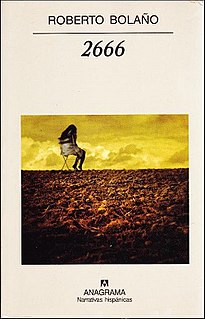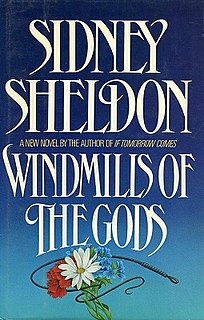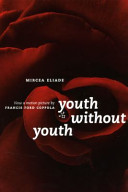 W
W2666 is the last novel by Roberto Bolaño. It was released in 2004, a year after Bolaño's death. Its themes are manifold, and it revolves around an elusive German author and the unsolved and ongoing murders of women in Santa Teresa, a violent city inspired by Ciudad Juárez and its epidemic of female homicides. In addition to Santa Teresa, settings and themes include the Eastern Front in World War II, the academic world, mental illness, journalism, and the breakdown of relationships and careers. 2666 explores 20th-century degeneration through a wide array of characters, locations, time periods, and stories within stories.
 W
WThe Appointment is a novel by German author Herta Müller. The novel was originally published in German in 1997 and later in English by Metropolitan Books and Picador, a Macmillan imprint, in 2001. The novel was one of several for which Müller was known when she received the Nobel Prize in Literature in 2009. The Appointment portrays the humiliations of Communist Romania, told from the perspective of a young woman working as a clothing-factory worker who has been summoned by the secret police. She is accused of sewing notes into the linings of men's suits bound for Italy asking that the recipient marry her to help her get out of the country.
 W
WThe Carpathian Castle is a novel by Jules Verne first published in 1892. It is possible that Bram Stoker took inspiration from this for his 1897 novel Dracula. Due to castle aspect and local toponymy, it is assumed that Colț Castle (ro) in Hunedoara county inspired Jules Verne.
 W
WColdheart Canyon is a novel by Clive Barker, published in 2001 by HarperCollins. The paperback edition was published by HarperTorch on November 5, 2002 (ISBN 006103018X). The story centers on Todd Pickett, a failing movie star, and Tammy Lauper, Todd's obsessive fan.
 W
WCraii de Curtea-Veche is a novel by the inter-war Romanian author Mateiu Caragiale. Published in 1929, it took the author more than two decades to complete, and constituted his only major work.
 W
WDracula is an 1897 Gothic horror novel by Irish author Bram Stoker. It introduced the character of Count Dracula and established many conventions of subsequent vampire fantasy. The novel tells the story of Dracula's attempt to move from Transylvania to England so that he may find new blood and spread the undead curse, and of the battle between Dracula and a small group of people led by Professor Abraham Van Helsing.
 W
WDracula the Undead is a sequel written to Bram Stoker's classic novel Dracula, written by Freda Warrington. The book was commissioned by Penguin Books as a sequel to Stoker's original novel for the centenary of the latter's first publication. It takes place seven years after the original. It was originally published in 1997, and was brought back to print in 2009.
 W
WLe cinquième fils (1983), translated as The Fifth Son (1985) is a novel by Elie Wiesel continuing the thematic material of The Testament. It won the Grand Prize in Literature from the city of Paris.
 W
WThe Forgotten is a novel by Elie Wiesel, published in 1992 in French. It follows two men, Elhanan Rosenbaum, and his son Malkiel. Elhanan is suffering from an incurable disease that causes him to lose his memory slowly, something like amnesia. Elhanan tells Malkiel the story of his past before he forgets it all. Malkiel is compelled to go to the village in Romania where his father failed to stop a crime from occurring, a memory that continues to haunt him. Malkiel encounters the truth about his father and attempts to deal with the past.
 W
WThe Great Fortune is a novel by English writer Olivia Manning first published in 1960. It forms the opening part of a six-part novel series called Fortunes Of War. The Fortunes Of War series itself is split into two trilogies, The Balkan Trilogy and The Levant Trilogy. The novels tell an unfolding story of how the Second World War impacts on the lives of a group of British expatriates.
 W
WThe Hunger Angel is a 304-page prose poem by Herta Müller. The English translation is by Philip Boehm (2012).
 W
WThe Keep is a 1981 horror novel by American writer F. Paul Wilson. It is also the first volume in a series of six novels known as The Adversary Cycle. It appeared on the New York Times Best Seller list and has been adapted into a film by Michael Mann in 1983 and as a limited series of comics in 2005.
 W
WThe Land of Green Plums is a novel by Herta Müller, published in 1994 by Rowohlt Verlag. Perhaps Müller's best-known work, the story portrays four young people living in a totalitarian police state in Communist Romania, ending with their emigration to Germany. The narrator is an unidentified young woman belonging to the ethnic German minority. Müller said the novel was written "in memory of my Romanian friends who were killed under the Ceauşescu regime".
 W
WThe Last World is a 1988 novel by the Austrian writer Christoph Ransmayr. Set in an inconsistent time period, it tells the story of a man, Cotta, who travels to Tomi to search for the poet Naso, who had settled there in political exile, after hearing rumours that Naso has died. In the town, Cotta encounters a number of characters from Ovid's Metamorphoses. The Last World was published in English in 1990, translated by John E. Woods.
 W
WThe Passport is a novel by Nobel Prize-winning author Herta Müller, published in German in 1986. The German title refers to a saying in Romania. The novel, one of several for which the author was known when winning the Nobel in 2009, tells the story of a village miller in a German-speaking village in the Banat in Romania, who applies for permission to emigrate to West Germany. The novel was published in English by Serpent's Tail in 1989, the first of Müller's novels to be offered in direct translation.
 W
WPoor Dionis or Poor Dionysus is an 1872 prose work by Romanian poet Mihai Eminescu, classified by scholars as either a novel, a novella or a modern fairy tale. It is a liberal interpretation of contemporary German philosophy and ancient motifs, discussing themes such as time travel and reincarnation through the lens of post-Kantian idealism. Its eponymous central character, a daydreaming scholar, moves between selves over time and space, between his miserable home, his earlier existence as a monk in 15th-century Moldavia, and his higher-level existence as a celestial Zoroaster.
 W
WThe Romanian: Story of an Obsession is a true-to-life memoir by Bruce Benderson. The autobiographical text describes Benderson's encounters and journeys with a male Romanian street hustler through Romania and Hungary, whom he meets while on a journalism assignment and falls in love with. The plot is intertwined with a travelogue of Romania and references to Romanian history and culture, such as the life of the artist Constantin Brâncuși, the writer Panait Istrati and the love affair between Romania's interbellum king, Carol II, and his mistress, Magda Lupescu.
 W
WLe Testament d'un poète juif assassiné (1980), translated into English as The Testament (1981) is a novel by Elie Wiesel. The Testament, to be followed by The Fifth Son, and The Forgotten mark a thematic change in Elie Wiesel's telling of the Holocaust and its aftermath as Wiesel moves into telling the story of three children of the survivors. The novel takes the form of the memoirs of a Russian Jewish poet, Paltiel Kossova, whose idealism leads him to turn from his Jewish religious heritage towards communism. The novel won the Prix du Livre Inter, and Prix des Bibliothécaires, Prix Interallie 1980 and was nominated for the Prix Concourt.
 W
WTrue Faith and Allegiance is a political thriller, written by Mark Greaney and released on December 6, 2016. In the book, President Jack Ryan and The Campus must contain a massive intelligence breach that has been responsible for a series of terrorist attacks on American military and intelligence personnel. True Faith and Allegiance is Greaney's last book in the Jack Ryan series, which is part of the Tom Clancy universe. It debuted at number three on the New York Times bestseller list.
 W
WThe Turkish Gambit is the second novel from the Erast Fandorin series of historical detective novels by Russian author Boris Akunin. It was published in Russia in 1998. The English translation by Andrew Bromfield was published in 2005 as third of Fandorin novels, after Murder on the Leviathan which follows it in the internal chronology.
 W
WViaţa ca o pradă is a 1977 partly-autobographical novel by Romanian author Marin Preda.
 W
WWindmills of the Gods is a 1987 thriller novel by American writer Sidney Sheldon.
 W
WYouth Without Youth is a 1976 novella by Romanian author Mircea Eliade. It follows the life of Dominic Matei, an elderly Romanian intellectual who experiences a cataclysmic event that allows him to live a new life with startling intellectual capacity. In 2007, it was adapted into a film by Francis Ford Coppola, also titled Youth Without Youth.